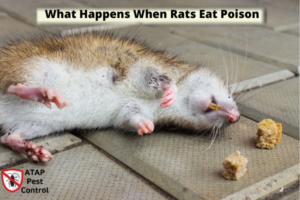Atap Pest Control is the best company that does rat control in Chicago. For more information, call .
Rats can be found in various habitats and often rely on your home for refuge and food. They also breed rapidly, which means that if you do not eliminate them promptly, you risk a large rat population spreading into your home. If you’ve seen a rat lately in or around your home, you may be thinking about a variety of things. Is it possible for there to be more than one? How did they get there? What are they munching on? And, maybe most importantly, how do I eliminate them?
When attempting to eradicate an enormous colony of rats, many people immediately think of poisons. While this method may appear enticing owing to its broad-covered approach, there are some things you should consider before using poisons to exterminate pests. Spend a few minutes learning about how rat poisons operate and how they might have a broader impact on your community and environment.

Why Isn’t Rat Poison Always Effective?
Many individuals, particularly those seeking professional pest management, feel that poison efficiently eradicates rats from their houses. Rodenticides are a critical component of professional rodent management. However, rat poison is applied recklessly; it threatens pets and untargeted wildlife and children. It is because it is enticing to animals and little children. Numerous rodenticides are brightly colored and pleasant in flavor to entice rats to consume long enough to be effective. You can see how this could become a problem if it is not handled near children and other animals with extreme caution. Second, rats do not usually die immediately after consuming rat poison. They may flee to another site, hunger, and then be scavenged by another animal or pet, passing the poison. You can contact rat exterminators near me for the best and quick services.
Rat poison is abhorrently brutal, causing rodent misery and contaminating other animals.
How Rat Poison Work
There are various forms of rat poisons or rodenticides as they are correctly referred to. In general, the objective of rodenticides is to lure pests into eating them, so slowly killing them. Because rats are cunning, commercial businesses develop pleasant poisons to entice them to return. It is where the deliciously sweet and vibrantly colored pellets come into action. They are disguised as a satisfying treat for rats but contain potentially lethal substances.
Rat poisons are available in various formulations and kill rats in multiple ways. Anticoagulants are perhaps the most common (and one of the harshest) variants. Anticoagulants inhibit the coagulation of rats’ blood, eventually killing them from within. Depending on the poison’s dose, the rat may exhibit symptoms for days or succumb within a day of eating.
Naturally, the potency of poison is contingent upon a variety of conditions. For instance, you must place the poison in areas where you detect rodent activity. If you don’t position them in well-known locations, it’s unlikely they’ll find the bait at all. There is a chance that anything will eventually. If you opt to employ poison, it is critical to monitor the pellets in your place.
Occasionally, you may believe you have a mouse problem rather than a rat one. A rat can consume more food than a mouse-based on its size. Calculating the correct amount of bait for a rat versus a mouse can also be challenging – much more so when dealing with many pests.
If rodents discover alternative food sources, they will most significantly avoid the poison. If you are too busy to clean your home frequently, you may leave trace amounts of food that attract rats more than the poison, rendering it ineffective.
Typical Rodenticide Adverse Effects:
Because rodenticides are highly poisonous to animals, you face the risk of your cat or dog swallowing the pellets accidentally. The following are common indicators of rodenticide toxicity in your pet:
- Bleeding in the mouth and nose
- Blood loss on the inside
- Pain and weakness in the muscles
- Breathing difficulties
- Coma
Your pet’s life may be at risk due to the toxicity of rodenticides for mammals. Seek veterinarian attention immediately to avoid serious problems.
Additionally, your family is at risk of rodenticide poisoning. It is likely to irritate if it directly touches the skin. When this toxin is swallowed, however, it can cause nosebleeds and a variety of other hazardous adverse effects. If you detect any strange symptoms, get medical attention immediately.
Poison is Both Brutal and Lethal
Once inside your home, rats and mice become pests. They do, however, serve a purpose in our ecology. Often, rodents transport seeds underground and store them for later consumption. They leave seeds behind as they relocate, which eventually sprout into new vegetation. Poisoning rats is a horrible method of death. They are slowly bleeding to death and in agony, depending on how quickly they consume the poison. If predators consume the poisoned rats, their chances of dying gradually increase.
It would help if you also understood what happens when rats eat poison. The same holds for your dogs. If your cat or dog consumes a poisoned rat, it will undoubtedly suffer secondary poisoning. As a result, you’ll have to choose between the risk of your pet dying and the high cost of veterinary care.
ATAP Exterminator
When searching for the ideal pest control method, you should consider employing non-toxic traps. ATAP Exterminator offers quick-kill traps that activate instantly upon setup. Best of all, they do not contain hazardous poisons, which eliminates the possibility of poisoning your dogs. Ensure that you follow the appropriate guidelines to achieve the best outcomes.
However, automatic traps are effective in all weather conditions, whether you wish to prevent an infestation inside or outside your home. You can place them on your porch, under furniture, in openings, or in other areas of your home where you detect droppings. Best of all, unlike traditional rat traps or poison, these items are built to last.
Nobody wants to live under a rat infestation. Apart from being an annoyance, rodents spread disease and track it into your home. They leave bacteria and residue on your worktops and floors just by touching them. These bacteria and residue can then contact your skin or body and cause illness.
On the other hand, you do not want to put your family or pets in danger to eliminate a rat or mouse. Instead of poisons, consider utilizing an automatic trap; for this, ATAP is the best in their services.
